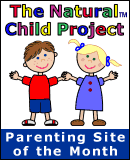| Vaccinations never
used to be the least bit controversial. Or, if they were, I wasn't
aware of the controversy. Now I spend a very large portion of every
day discussing the eight or nine different vaccinations given to
children in the first years of life and there is no end in sight
-- no end to the discussions and no apparent end to the number of
new vaccines which will become available over the next few years.
If I were to be
invited to participate in a consultation about public health or
global vaccine policy, I would readily state that vaccines do
much more good than harm.
In my office I
am consulted about one child at a time. I tell the parents that
I believe that each vaccine deserves a risk/benefit analysis with
each individual child. Families which travel extensively are certainly
more likely to be exposed to diseases nearly extinct in America.
Breastfeeding babies in healthy families whose vacations are less
than exotic are less likely to be anywhere near someone with polio,
diphtheria or measles.
I have listened
to many different points of view about vaccination and am very
tired of hearing people "shout" about the issue. Calm,
reasoned discussions will give parents the information they need
to make informed choices about vaccines.
One simple fact:
99% of doctors favor vaccinating every child and teenager with
available vaccines at all the appropriate ages. Only a very small
number of doctors and other authorities favor any other point
of view, be it delaying vaccines or not giving some or all of
the shots.
The
first shot offered to your baby is a hepatitis B vaccination which
some doctors still choose to give in the hospital within the first
48 hours of life. Hepatitis B is a potentially "permanent"
illness which can lead to chronic liver inflammation, damage and
eventually liver cancer. The vaccine has helped reduce the incidence
of hepatitis B in America by 90%. The disease is contracted through
high risk behavior: intravenous drug use or sexual contact but
some authorities say that more mundane activities such as sharing
a toothbrush or razor can transmit the virus. I prefer to give
this vaccine much later in life when I give it. A small minority
of vaccine experts argue that the hepatitis has adverse consequences
which lead to autoimmune diseases like multiple sclerosis and
diabetes. Although they have gathered data supporting their position,
the vast majority of experts refute this idea and support universal
vaccination against hepatitis B.
At the six week
or two month appointment, the DPaT, IPV, HIB, Prevnar and second
HBV are routinely given. These initials stand for, respectively,
diphtheria/acellular pertussis/tetanus, inactivated polio vaccine,
hemophilus influenza B, and the newer pneumococcus vaccine. In
large measure because of vaccination policies, none of these illnesses
are common in America. We see an average of one case per year
of diphtheria per year in the entire country and 60 to 70 cases
of tetanus. There are still thousands of cases of pertussis (whooping
cough), most of which do not get diagnosed and which cause rare
hospitalizations and even rarer fatalities. Whooping cough can
be fatal in children under six weeks of age (1 out of 200 cases
in the midst of an epidemic) and in virtually no other cases.
Tetanus is very
rare and occurs mostly in older adults and others with compromised
immune systems. The problem I have faced with children who do
not have complete tetanus immunity is that I cannot answer the
question, "Could this wound cause tetanus? What are the chances?"
The honest answer is that a healthy immune system can almost always
defeat the clostridia tetani bacterium. Almost always. I have
no percentage nor great answer for people who have fewer than
three shots or whose immunity is "out of date." I am
quite certain that very few children would contract tetanus even
if they were unvaccinated, but I have no proof. I worry, parents
worry and the only answer is to get a "tetanus immune globulin"
injection to create instant immunity. After a bad wound, there
is no certainty of protection with just one shot or even with
a second tetanus (or DPaT) injection.
Wild polio has
not been in America since 1979. There is presently no wild polio
in the Western Hemisphere and it has been obliterated from the
Pacific Rim. Most cases of polio are in smaller villages in Africa
and in countries in Asia. There have not been recorded cases of
immigrants to the USA bringing in polio for decades. Over the
past two decades, there have been sporadic outbreaks in Jamaica,
the Netherlands, Israel and elsewhere when a person emigrated
from another country and found a susceptible group of unvaccinated
people. The Netherlands outbreak was among a group of Amish. Many
docs and grandparents, and some parents remember the polio epidemic
of the 1950s. There is a lot of scientific support and a huge
amount of emotional support for continuing to vaccinate thoroughly
against this illness even though it no longer exists in America.
The elimination of the oral polio immunization, which was a "live"
vaccine, has also eliminated vaccine-associated polio in the U.S.
Other countries still use this vaccine and it works extremely
well. The risk was small, but the IPV doesn't carry even that
tiny chance of transmitting polio from a vaccinee to a susceptible
adult or child.
Hemophilus influenza
B used to be the major cause of meningitis under two years of
age and now that type of meningitis has been almost completely
eliminated from pediatric practice. This is a true testimony to
the effectiveness of this shot. It is also a strong argument for
initiating the risk/benefit analysis I mentioned. Again, a very
small minority of vaccine researchers have concluded that the
HIB vaccine is another cause of autoimmune problems. There have
even been research articles in mainstream medical journals supporting
this point of view. And, again, the vast majority (99% or more)
of physicians and experts do not believe that the risk outweighs
the benefits. Besides meningitis, this bacteria can cause epiglottitis
and other "invasive" infections. I have not seen a case
of HIB disease in quite a few years.
The Prevnar vaccine
is too new for me to recommend. The number of cases of Pneumococcal
ear infections which could be prevented is very small and the
number of cases of meningitis prevented is also small. I have
no quarrel with doctors who recommend the shot or with parents
who choose to get it. I have very strong objections to advertising
this immunization to the general public on television. I don't
think enough information can be disseminated in 60 seconds.
The second HBV
continues the buildup of antibodies against hepatitis B.
(The other commonly
mentioned hepatitides are hep A and hep C. Hepatitis A is not
a permanent disease but can ruin an adult's vacation and even
lead to hospitalization. The vaccine must be considered seriously
by travelers. Hepatitis C is deadly and we have no vaccine for
this or the other most-commonly discussed sexually transmitted
killer, HIV.)
DPaT, HIB and IPV
booster doses are given at the 4 month check up and then another
DPaT and HIB at the six month visit. Most experts do not give
a third IPV until the 18 month visit. The DPaT is given again
at 18 months as is the HIB. A third HBV is given at 18 months
of age although this timing may vary.
At one year of
age, a child is to receive the measles/mumps/rubella vaccine.
The MMR has received more notoriety in the past year or two than
all the other shots combined. Research in England and elsewhere
tied the shot to an increase in intestinal problems linked with
autism. As I have mentioned over and over again above, the vast
majority of experts discount these findings and feel that the
benefits of the triple shot outweigh the risk. They remind us
that, even though America is in the third year during which we
will have fewer than 100 cases of measles reported, in India,
there are an average of 1,000,000 deaths each year. Most of these
deaths are in children. Rubella is dangerous to a fetus at certain
stages of pregnancy and mumps can decrease fertility in men who
catch the disease. I evaluate this vaccine and discuss it on a
case by case basis in my office.
Vaccinating college
students against meningococcal meningitis has become official
policy on many campuses. If we vaccinate every single college
student against this terrible disease, it has been estimated that
we would prevent a half dozen cases of the disease each year.
If the vaccine has any risk associated (none has been proved)
this benefit is not great enough in my opinion.
In
a public venue such as this, or on a TV show or in a national
newsmagazine, I don't think enough of a dialogue or evaluation
can take place. For that reason, I would rather attempt to give
information and let parents expand their knowledge with reading
and talking. I do not vaccinate all of my patients and I don't
feel that these partially vaccinated or unvaccinated children
are at high risk. I think that if national vaccine policy shifts
away from universal vaccination, outbreaks could occur.
|





